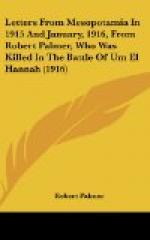One other officer of ours was captured and we only found that out incidentally. There has been no official list of prisoners and I don’t think the Army Headquarters here know who was taken. I don’t know whether you would have the means of getting this from the Turks through the War Office. I believe attempts are being made here. I think there is a chance of his being a prisoner as the Regiment got pretty near the trenches, but I can get no information from any of our men. I will cable at once if I hear anything.
I saw yesterday a copy of the Pioneer (Allahabad) for January 30th, and that reported your son wounded. I hoped, therefore, that he had been sent to India and the medical people in this country had omitted to make any record of it, but I imagine in that case he would surely have cabled to you himself, and I fear the only hope is that he may be a prisoner of war.
Your son was attached to my Company latterly and besides being very keen and capable was a great favourite with the men, and we all miss him very much indeed. I hope your Lordship will accept my deepest sympathy in your anxiety, and I sincerely hope that your son may be safe.
(Signed) H.M. FOSTER,
Capt. 1/4th Hants Regt.
* * * * *
H.M.S. “MANTIS,”
May, 1916.
DEAR LORD SELBORNE.
I am more grieved than I can say to have given you the news which I telegraphed yesterday. I know how cruel the anxiety of doubt is, and telegraphed to you when I had the evidence which I and my friends here considered reliable.
About six days ago I went out to the Turks to discuss terms for the surrender of Kut. I spent the night in their camp and have been with them several times since then. I asked them for information about three names. About two of the names I could get little information. On the third day I received a message from Ali Jenab Bey, telling me that your son had died in hospital, and that all that could be done for him had been done, and asking me to tell you how deeply he sympathised with you. The next day Ali Jenab and two other Turks came into our camp. One of them, Mohammed Riza, a relation of Jenab Pashas, told me that your son had been brought in after the fight on the 21st, slightly wounded in the shoulder and badly wounded in the chest. He had been well looked after by the Doctors and the Colonel of the Regiment (I could not find out which Regiment) had visited him, and at the Doctor’s wish sent him some brandy. He did not suffer and the end came after four hours.
It is useless to try to tell you how sorry I feel for you and all of yours. In this campaign, which in my mind has been the most heroic of all, many of our men who have given their lives have suffered very long and very terribly, and when one hears of a friend who has gone, one is glad in this place, to know that he has been spared that sacrifice.




